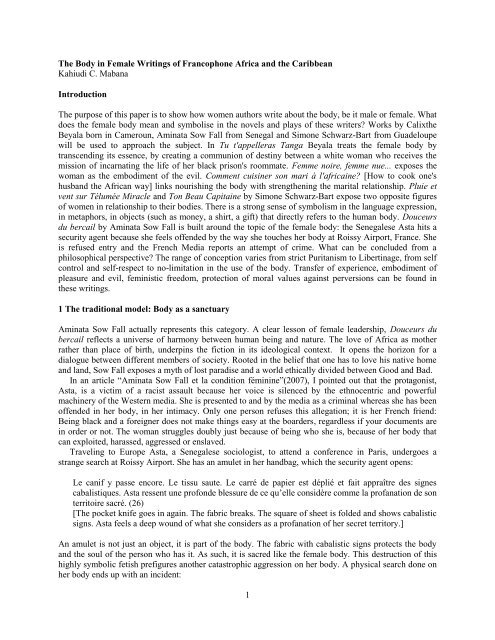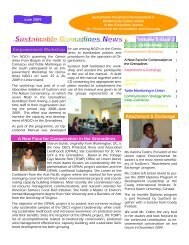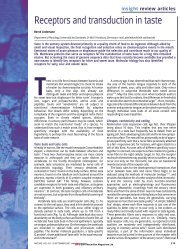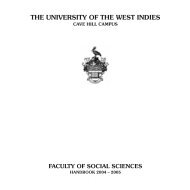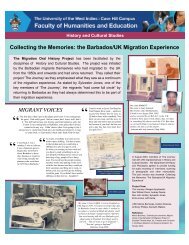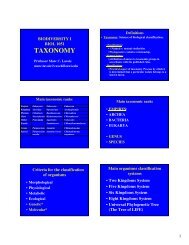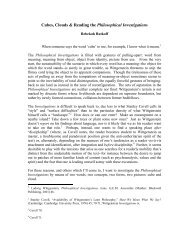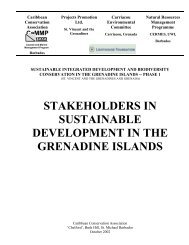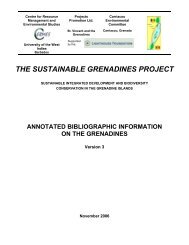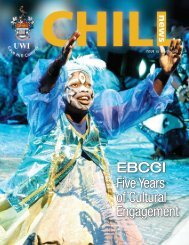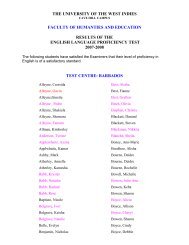1 The Body in Female Writings of Francophone Africa and the ...
1 The Body in Female Writings of Francophone Africa and the ...
1 The Body in Female Writings of Francophone Africa and the ...
Create successful ePaper yourself
Turn your PDF publications into a flip-book with our unique Google optimized e-Paper software.
<strong>The</strong> <strong>Body</strong> <strong>in</strong> <strong>Female</strong> Writ<strong>in</strong>gs <strong>of</strong> <strong>Francophone</strong> <strong>Africa</strong> <strong>and</strong> <strong>the</strong> Caribbean<br />
Kahiudi C. Mabana<br />
Introduction<br />
<strong>The</strong> purpose <strong>of</strong> this paper is to show how women authors write about <strong>the</strong> body, be it male or female. What<br />
does <strong>the</strong> female body mean <strong>and</strong> symbolise <strong>in</strong> <strong>the</strong> novels <strong>and</strong> plays <strong>of</strong> <strong>the</strong>se writers? Works by Calix<strong>the</strong><br />
Beyala born <strong>in</strong> Cameroun, Am<strong>in</strong>ata Sow Fall from Senegal <strong>and</strong> Simone Schwarz-Bart from Guadeloupe<br />
will be used to approach <strong>the</strong> subject. In Tu t'appelleras Tanga Beyala treats <strong>the</strong> female body by<br />
transcend<strong>in</strong>g its essence, by creat<strong>in</strong>g a communion <strong>of</strong> dest<strong>in</strong>y between a white woman who receives <strong>the</strong><br />
mission <strong>of</strong> <strong>in</strong>carnat<strong>in</strong>g <strong>the</strong> life <strong>of</strong> her black prison's roommate. Femme noire, femme nue... exposes <strong>the</strong><br />
woman as <strong>the</strong> embodiment <strong>of</strong> <strong>the</strong> evil. Comment cuis<strong>in</strong>er son mari à l'africa<strong>in</strong>e? [How to cook one's<br />
husb<strong>and</strong> <strong>the</strong> <strong>Africa</strong>n way] l<strong>in</strong>ks nourish<strong>in</strong>g <strong>the</strong> body with streng<strong>the</strong>n<strong>in</strong>g <strong>the</strong> marital relationship. Pluie et<br />
vent sur Télumée Miracle <strong>and</strong> Ton Beau Capita<strong>in</strong>e by Simone Schwarz-Bart expose two opposite figures<br />
<strong>of</strong> women <strong>in</strong> relationship to <strong>the</strong>ir bodies. <strong>The</strong>re is a strong sense <strong>of</strong> symbolism <strong>in</strong> <strong>the</strong> language expression,<br />
<strong>in</strong> metaphors, <strong>in</strong> objects (such as money, a shirt, a gift) that directly refers to <strong>the</strong> human body. Douceurs<br />
du bercail by Am<strong>in</strong>ata Sow Fall is built around <strong>the</strong> topic <strong>of</strong> <strong>the</strong> female body: <strong>the</strong> Senegalese Asta hits a<br />
security agent because she feels <strong>of</strong>fended by <strong>the</strong> way she touches her body at Roissy Airport, France. She<br />
is refused entry <strong>and</strong> <strong>the</strong> French Media reports an attempt <strong>of</strong> crime. What can be concluded from a<br />
philosophical perspective? <strong>The</strong> range <strong>of</strong> conception varies from strict Puritanism to Libert<strong>in</strong>age, from self<br />
control <strong>and</strong> self-respect to no-limitation <strong>in</strong> <strong>the</strong> use <strong>of</strong> <strong>the</strong> body. Transfer <strong>of</strong> experience, embodiment <strong>of</strong><br />
pleasure <strong>and</strong> evil, fem<strong>in</strong>istic freedom, protection <strong>of</strong> moral values aga<strong>in</strong>st perversions can be found <strong>in</strong><br />
<strong>the</strong>se writ<strong>in</strong>gs.<br />
1 <strong>The</strong> traditional model: <strong>Body</strong> as a sanctuary<br />
Am<strong>in</strong>ata Sow Fall actually represents this category. A clear lesson <strong>of</strong> female leadership, Douceurs du<br />
bercail reflects a universe <strong>of</strong> harmony between human be<strong>in</strong>g <strong>and</strong> nature. <strong>The</strong> love <strong>of</strong> <strong>Africa</strong> as mo<strong>the</strong>r<br />
ra<strong>the</strong>r than place <strong>of</strong> birth, underp<strong>in</strong>s <strong>the</strong> fiction <strong>in</strong> its ideological context. It opens <strong>the</strong> horizon for a<br />
dialogue between different members <strong>of</strong> society. Rooted <strong>in</strong> <strong>the</strong> belief that one has to love his native home<br />
<strong>and</strong> l<strong>and</strong>, Sow Fall exposes a myth <strong>of</strong> lost paradise <strong>and</strong> a world ethically divided between Good <strong>and</strong> Bad.<br />
In an article “Am<strong>in</strong>ata Sow Fall et la condition fém<strong>in</strong><strong>in</strong>e”(2007), I po<strong>in</strong>ted out that <strong>the</strong> protagonist,<br />
Asta, is a victim <strong>of</strong> a racist assault because her voice is silenced by <strong>the</strong> ethnocentric <strong>and</strong> powerful<br />
mach<strong>in</strong>ery <strong>of</strong> <strong>the</strong> Western media. She is presented to <strong>and</strong> by <strong>the</strong> media as a crim<strong>in</strong>al whereas she has been<br />
<strong>of</strong>fended <strong>in</strong> her body, <strong>in</strong> her <strong>in</strong>timacy. Only one person refuses this allegation; it is her French friend:<br />
Be<strong>in</strong>g black <strong>and</strong> a foreigner does not make th<strong>in</strong>gs easy at <strong>the</strong> boarders, regardless if your documents are<br />
<strong>in</strong> order or not. <strong>The</strong> woman struggles doubly just because <strong>of</strong> be<strong>in</strong>g who she is, because <strong>of</strong> her body that<br />
can exploited, harassed, aggressed or enslaved.<br />
Travel<strong>in</strong>g to Europe Asta, a Senegalese sociologist, to attend a conference <strong>in</strong> Paris, undergoes a<br />
strange search at Roissy Airport. She has an amulet <strong>in</strong> her h<strong>and</strong>bag, which <strong>the</strong> security agent opens:<br />
Le canif y passe encore. Le tissu saute. Le carré de papier est déplié et fait appraître des signes<br />
cabalistiques. Asta ressent une pr<strong>of</strong>onde blessure de ce qu’elle considère comme la pr<strong>of</strong>anation de son<br />
territoire sacré. (26)<br />
[<strong>The</strong> pocket knife goes <strong>in</strong> aga<strong>in</strong>. <strong>The</strong> fabric breaks. <strong>The</strong> square <strong>of</strong> sheet is folded <strong>and</strong> shows cabalistic<br />
signs. Asta feels a deep wound <strong>of</strong> what she considers as a pr<strong>of</strong>anation <strong>of</strong> her secret territory.]<br />
An amulet is not just an object, it is part <strong>of</strong> <strong>the</strong> body. <strong>The</strong> fabric with cabalistic signs protects <strong>the</strong> body<br />
<strong>and</strong> <strong>the</strong> soul <strong>of</strong> <strong>the</strong> person who has it. As such, it is sacred like <strong>the</strong> female body. This destruction <strong>of</strong> this<br />
highly symbolic fetish prefigures ano<strong>the</strong>r catastrophic aggression on her body. A physical search done on<br />
her body ends up with an <strong>in</strong>cident:<br />
1
Asta a accepté d’enlever sa veste, ses chaussures et ses bas. Elle refuse d’ôter le reste. Des ma<strong>in</strong>s<br />
gantées lui balaient toutes les parties du corps, passent sous le soutien-gorge, descendant<br />
jusqu’aux genoux, remontent sous la jupe. Asta frissonne de dégoût. Elle a le sentiment qu’on la<br />
brise. Les ma<strong>in</strong>s montent. […] Asta sert la jambe. La ma<strong>in</strong> <strong>in</strong>siste, elle a de la vigueur et,<br />
sûrement, de l’expérience. Asta ne veut pas être va<strong>in</strong>cue. Elle sursaute. « Jamais ! » se dit-elle.<br />
Une rage bestiale la saisit. Elle voudrait hurler sa colère mais ne peut émettre aucun son. Ses deux<br />
ma<strong>in</strong>s, comme les crocs d’un automate, se ferment brusquement sur le cou de son vis-à-vis. Asta<br />
s’y agrippe de toutes ses forces, les dents serrées, et n’entend même pas le cri déchirant qui attire<br />
une meute de policiers. (27-28).<br />
[Asta has accepted to remove her jacket, her shoes <strong>and</strong> her stock<strong>in</strong>gs. She refuses to remove <strong>the</strong><br />
rest. Gloved h<strong>and</strong>s sweep up all her body’s parts, go under <strong>the</strong> bra, go down to <strong>the</strong> knees, come<br />
up back under <strong>the</strong> skirt. Asta shivers <strong>of</strong> disgust. She has <strong>the</strong> feel<strong>in</strong>g that she is be<strong>in</strong>g broken. <strong>The</strong><br />
h<strong>and</strong>s go back up. […] Asta tightens her legs. <strong>The</strong> h<strong>and</strong> <strong>in</strong>sists, it has some vigour <strong>and</strong>, surely,<br />
experience. Asta does not want to surrender. […] A bestial rage takes her. She would like to shout<br />
her anger but cannot give out a sound. Both her h<strong>and</strong>s, like <strong>the</strong> hooks <strong>of</strong> an automaton, squeeze<br />
briskly on <strong>the</strong> neck <strong>of</strong> her counterpart. Asta catches with all her strengths, clenched teeth, <strong>and</strong><br />
does not even hear <strong>the</strong> heart-rend<strong>in</strong>g shout which attracts a pack <strong>of</strong> policemen.]”<br />
Asta is arrested because she has assault an agent, but nobody states that she has protected her body, her<br />
sacred body from pr<strong>of</strong>anation. By outrageously touch<strong>in</strong>g her <strong>in</strong>timate parts, <strong>the</strong> female security agent<br />
takes advantage <strong>of</strong> her dom<strong>in</strong>at<strong>in</strong>g position to violate Asta’s <strong>in</strong>timacy, leav<strong>in</strong>g her with no o<strong>the</strong>r<br />
alternative but to defend herself. <strong>The</strong>refore, she is arrested without be<strong>in</strong>g heard, silenced to death, because<br />
she is nobody <strong>and</strong> has no rights. Worse, she is sent back to Senegal <strong>in</strong> a charter like a crim<strong>in</strong>al. All this<br />
humiliation occurs because she has defended her body.<br />
After this humiliation Asta is conv<strong>in</strong>ced that <strong>Africa</strong>ns do not need to move to Europe or <strong>the</strong> West, that<br />
<strong>Africa</strong> is <strong>the</strong> best home for <strong>Africa</strong>ns, she builds a Teranga village with some friends, where <strong>the</strong>y wish to<br />
live <strong>in</strong> peace, underst<strong>and</strong><strong>in</strong>g <strong>and</strong> mutual support. In that village life is so rooted <strong>in</strong> <strong>the</strong> <strong>Africa</strong>n tradition<br />
that <strong>the</strong> marital relationship is conceived accord<strong>in</strong>g to <strong>the</strong> traditional way as exemplified by Dianor, a<br />
bl<strong>in</strong>d man, <strong>and</strong> his wife B<strong>in</strong>eta. Actually Dianor has become bl<strong>in</strong>d follow<strong>in</strong>g a snake’s poison attack:<br />
- Je t’avais dit que je ne suis pas aveugle, n’est-ce pas…<br />
- Je sais bien que tu n’es pas aveugle.<br />
- […]<br />
- Tu crois que je n’ai pas remarqué un peu plus de coquetterie, un peu plus de so<strong>in</strong>s ?<br />
- Hiii ! B<strong>in</strong>eta est passée par là !<br />
- Est-ce que B<strong>in</strong>eta n’est pas celle par qui je peux voir le monde ?<br />
- Mais si, mais si !<br />
- Tu crois que je n’ai pas remarqué la manière dont Babou te regarde ? (222-223)<br />
- [I told you that I am not bl<strong>in</strong>d, didn't I.<br />
- I do know that you are not bl<strong>in</strong>d.<br />
- [...]<br />
- You th<strong>in</strong>k that I have not noticed a little more coquetry, a little more cares?<br />
- Hiii! B<strong>in</strong>eta has gone through <strong>the</strong>re.<br />
- Is B<strong>in</strong>eta not <strong>the</strong> one through whom I can see <strong>the</strong> world?<br />
- Right! Right!<br />
- Do you th<strong>in</strong>k I have not noticed <strong>the</strong> way Babou looks at you?]<br />
2
That man can proudly that his wife is his “eyes”. <strong>The</strong> absent eyes or <strong>the</strong> absence <strong>of</strong> vision is replaced by<br />
<strong>the</strong> perception <strong>of</strong> <strong>the</strong> o<strong>the</strong>r. Dianor sees through <strong>the</strong> eyes <strong>of</strong> B<strong>in</strong>eta. Both <strong>of</strong> <strong>the</strong>m form a wonderful<br />
couple, discreet accomplices <strong>in</strong> <strong>the</strong> fulfilment <strong>of</strong> <strong>the</strong>ir marital commitments.<br />
On <strong>the</strong> o<strong>the</strong>r h<strong>and</strong> <strong>the</strong>re is <strong>in</strong> Douceurs du bercail a severe critique <strong>of</strong> <strong>the</strong> new society, especially <strong>of</strong><br />
<strong>the</strong> youth <strong>in</strong> connexion with <strong>the</strong>ir carelessness <strong>and</strong> neglect <strong>of</strong> self-respect. Urban life opens to excesses.<br />
Pik<strong>in</strong>e Tougal, a hot-red area <strong>of</strong> Dakar, <strong>in</strong>carnates <strong>the</strong> Bad, <strong>the</strong> s<strong>in</strong>, immorality <strong>and</strong> uncontrolled freedom<br />
<strong>of</strong> customs. It is a place especially dedicated to pleasures <strong>of</strong> music, dance, alcohol, food, sex, life. A place<br />
<strong>of</strong> extravaganza! As an illustration <strong>of</strong> excess, a girl named Câl<strong>in</strong>e has sex not with one but with a group <strong>of</strong><br />
teen mates:<br />
[…] éméchée au sortir d’une boîte de nuit, elle avait laissé faire une b<strong>and</strong>e de jeunes gens, sur le<br />
banc d’un jard<strong>in</strong> public et avait a<strong>in</strong>si « ramassé » une grossesse ; elle avait voulu la garder pour<br />
coir comment c’était d’être maman, puisqu’elle-même n’avait jamais connu sa mère qui l’avait<br />
ab<strong>and</strong>onnée sur le parvis d’une église (157)<br />
[Câl<strong>in</strong>e: tipsy com<strong>in</strong>g out <strong>of</strong> a night club, she had <strong>of</strong>fered her body to a group <strong>of</strong> young people,<br />
on a bench <strong>of</strong> a public garden <strong>and</strong> she had thus "collected" a pregnancy; she had wanted to keep it<br />
to see how it looked out to be a mo<strong>the</strong>r, because herself had never known her mo<strong>the</strong>r who had<br />
ab<strong>and</strong>oned her <strong>in</strong> front <strong>of</strong> a church.]<br />
Câl<strong>in</strong>e decides not to term<strong>in</strong>ate pregnancy <strong>and</strong> to keep <strong>the</strong> unborn baby just <strong>in</strong> order to experience<br />
mo<strong>the</strong>rhood, to fulfil <strong>the</strong> absence <strong>of</strong> <strong>the</strong> mo<strong>the</strong>r she never knew. As a matter <strong>of</strong> fact, she has no guide to<br />
advise her. Lost or totally immersed <strong>in</strong> <strong>the</strong> chaotic world, she is <strong>the</strong> perfect female character empowered<br />
by fem<strong>in</strong>ist ideologies. Her body is hers; she treats it as it pleases her, nobody controls her voice <strong>and</strong> her<br />
body. No power, no authority, just herself with her fate. <strong>The</strong> same can be said <strong>of</strong> Fabala with her<br />
irresponsible mo<strong>the</strong>rhood: “Trois enfants sans père, n’est-ce pas une double calamite! Le pire est qu’elle<br />
s’en fout…” [Three children without fa<strong>the</strong>r, it’s a double calamity, isn’t it? <strong>The</strong> worst is that she does not<br />
care…] By <strong>the</strong> way <strong>the</strong>y h<strong>and</strong>le <strong>the</strong>ir body, Câl<strong>in</strong>e <strong>and</strong> Fabala could easily act as typical female characters<br />
like <strong>the</strong> ones re-presented by Beyala, <strong>the</strong> only difference be<strong>in</strong>g that Beyala pushes <strong>the</strong> caricatured portrait<br />
to <strong>the</strong> extreme.<br />
2. "Writ<strong>in</strong>g under <strong>the</strong> sk<strong>in</strong>"<br />
2.1 Construction <strong>of</strong> a “hybrid” Fem<strong>in</strong><strong>in</strong>ity<br />
Beyala’s Your Name Shall Be Tanga (Tu t'appelleras Tanga) treats <strong>the</strong> female body by transcend<strong>in</strong>g its<br />
essence, by creat<strong>in</strong>g a communion <strong>of</strong> dest<strong>in</strong>y between a white woman who receives <strong>the</strong> mission <strong>of</strong><br />
<strong>in</strong>carnat<strong>in</strong>g <strong>the</strong> life <strong>of</strong> her black prison's roommate. Two prison cellmates, Tanga <strong>and</strong> Anna-Claude, jo<strong>in</strong><br />
<strong>in</strong> a pact: “I am go<strong>in</strong>g to die, woman. White people die as well, you know ? To dive <strong>in</strong>to death as you do<br />
<strong>in</strong>to life. Without a visa, without a passport” (1) “I am you, you are me, were are one” (1).<br />
Beyond <strong>the</strong> races, <strong>the</strong>re is a common dest<strong>in</strong>y for <strong>the</strong>se two women, marg<strong>in</strong>alised by <strong>the</strong>ir <strong>Africa</strong>n <strong>and</strong><br />
European societies <strong>in</strong> which <strong>the</strong> male still dom<strong>in</strong>ates <strong>and</strong> send <strong>the</strong>m <strong>in</strong> jail because <strong>of</strong> <strong>the</strong>ir irreducibility<br />
to <strong>the</strong> system. Tanga <strong>and</strong> Anna-Claude do not fit <strong>in</strong> those societies because <strong>the</strong>y are different from <strong>the</strong><br />
o<strong>the</strong>r. By build<strong>in</strong>g this pact, by putt<strong>in</strong>g toge<strong>the</strong>r <strong>the</strong>ir bodies, <strong>the</strong>y create a path for <strong>the</strong>ir survival <strong>in</strong> a<br />
corporal <strong>and</strong> surreal way:<br />
Here, <strong>the</strong> merg<strong>in</strong>g <strong>of</strong> diverse cultural elements does not necessarily signify an erasure <strong>of</strong> one<br />
culture or trait; ra<strong>the</strong>r all elements <strong>in</strong>volved <strong>in</strong> <strong>the</strong> assimilation process are transformed by <strong>the</strong><br />
encounter. In <strong>the</strong>ir shared cell, Tanga <strong>and</strong> Anna-Claude exist <strong>in</strong> a type <strong>of</strong> “border zone,” removed<br />
from <strong>the</strong>ir unique cultural contexts. ( Westmorel<strong>and</strong> Bouchard, 65)<br />
3
2.2.1 <strong>The</strong> paranoiac Anna-Claude:<br />
A former pr<strong>of</strong>essor <strong>of</strong> philosophy <strong>in</strong> a French gymnasium, Anna-Claude does not fit at all <strong>in</strong> <strong>the</strong> school<br />
hierarchy. Delirious, crazy <strong>and</strong> totally <strong>in</strong>sane, she lives <strong>in</strong> ano<strong>the</strong>r world, she looks like somebody without<br />
any roots at her work place.<br />
When <strong>the</strong> time for class arrived, she’d go to meet her students aga<strong>in</strong>, with haggard eyes und<br />
unkempt hair. She’d sit on top <strong>of</strong> <strong>the</strong> front desk, with her chest pushed out, <strong>and</strong> she’d speak.<br />
Decisive, hard, mysterious. A teacher <strong>of</strong> philosophy, who would sacrifice Hegel <strong>and</strong> Kant to<br />
occult sciences. She’d endlessly affirm that <strong>the</strong> meet<strong>in</strong>g po<strong>in</strong>t <strong>of</strong> <strong>the</strong> world lay <strong>in</strong> <strong>the</strong> imag<strong>in</strong>ary<br />
<strong>and</strong> that it would suffice to close one’s eyes, to listen to one’s own vibrations to reach it. (2-3)<br />
In her m<strong>in</strong>d, <strong>the</strong>re is no limit between myth <strong>and</strong> reality, between dream <strong>and</strong> what actually happens around<br />
her. Conv<strong>in</strong>ced that she lived <strong>in</strong> <strong>Africa</strong> <strong>in</strong> a previous life, she start a quest for her <strong>Africa</strong>n identity. Her<br />
merg<strong>in</strong>g with Tanga somehow constitutes <strong>the</strong> fulfilment <strong>of</strong> a mad dream. And <strong>the</strong> dream is materialised<br />
by a spectral be<strong>in</strong>g, a ghost who will complete all her desires <strong>and</strong> her empt<strong>in</strong>ess. This confusion makes<br />
her fly <strong>in</strong> her imag<strong>in</strong>ary, so that she embarks <strong>in</strong> a quest for Ousmane, <strong>the</strong> male embodiment <strong>of</strong> all her<br />
deepest desires:<br />
Anna-Claude ! For <strong>the</strong> time be<strong>in</strong>g, she’d <strong>in</strong>vented her man. Fashioned to fit her dreams. She<br />
called him Ousmane. He was h<strong>and</strong>some, he was tall, he was smart. He lived <strong>in</strong> <strong>Africa</strong> where he<br />
was build<strong>in</strong>g bridges <strong>and</strong> roads <strong>and</strong> soon he’d be return<strong>in</strong>g to her <strong>in</strong> <strong>the</strong>ir Paris apartment. In her<br />
visions she imag<strong>in</strong>ed him. (3).<br />
Ousmane is not just a creation <strong>of</strong> her “folie” but <strong>the</strong> ma<strong>in</strong> reason for her life, <strong>the</strong> aim <strong>of</strong> everyth<strong>in</strong>g she has<br />
been long<strong>in</strong>g for s<strong>in</strong>ce she was born. <strong>The</strong> illusion even goes fur<strong>the</strong>r.<br />
To <strong>the</strong> men who accosted her <strong>in</strong> <strong>the</strong> street, on metro platforms, she’d say : "I am married ; I’m<br />
expect<strong>in</strong>g a baby." <strong>The</strong>y’d <strong>in</strong>sist, she’d persist. She’s add ano<strong>the</strong>r piece to this or that rickety<br />
detail, polish<strong>in</strong>g it up. She’d ended up by sculpt<strong>in</strong>g her sex <strong>in</strong> marble. (3-4).<br />
Not belong<strong>in</strong>g to France any more, she opts to move to In<strong>in</strong>gué, Ousmane’s birthplace <strong>and</strong> obta<strong>in</strong>s a<br />
teach<strong>in</strong>g position <strong>in</strong> <strong>the</strong> imag<strong>in</strong>ary former French colony. She is arrested because she participates <strong>in</strong> a<br />
march aga<strong>in</strong>st <strong>the</strong> public power, a male dom<strong>in</strong>ated society.<br />
2.2.2 “Ru<strong>in</strong>ed” Tanga:<br />
Tanga’s life has an irretrievable lack s<strong>in</strong>ce she feels an unfilled hole, empt<strong>in</strong>ess <strong>in</strong> her body. As Lynne<br />
Nottage would state, she is “ru<strong>in</strong>ed” because she once for all carries a shame <strong>in</strong> her body. She resists <strong>the</strong><br />
state by try<strong>in</strong>g to overcome <strong>the</strong> situation. A shame <strong>in</strong>carnated by her mo<strong>the</strong>r. Rebellious, she never<br />
forgets <strong>the</strong> harm <strong>of</strong> her mutilation. Her mo<strong>the</strong>r made <strong>the</strong> mistake – although it is just usual tradition – to<br />
sacrifice her to <strong>the</strong> clitoris snatcher’s altar:<br />
I can see her still, my mo<strong>the</strong>r old one, shimmer<strong>in</strong>g <strong>in</strong> her immaculate kaba, a black scarf <strong>in</strong> her<br />
hair, cry<strong>in</strong>g out to every god: ‘She has become a woman, she has become a woman. With that’, as<br />
she taps her beh<strong>in</strong>d, ‘she’ll keep any man.’ I didn’t weep. I didn’t say a th<strong>in</strong>g. I fell heir to <strong>the</strong><br />
blood between my legs. To a hole between my thighs. All that I was left with was <strong>the</strong> law <strong>of</strong><br />
oblivion. Time passed, I was becom<strong>in</strong>g accustomed to that part <strong>of</strong> me that was gone. I kidnapped<br />
<strong>the</strong> horde <strong>of</strong> memories. I tied <strong>the</strong>m up with str<strong>in</strong>g. (12)<br />
4
<strong>The</strong> practice <strong>of</strong> excision, that is highly spread throughout many countries <strong>of</strong> <strong>Africa</strong>, rema<strong>in</strong>s debatable. A<br />
girl does not become a woman unless she is excised. In recent times, voices have been raised aga<strong>in</strong>st this<br />
dangerous <strong>and</strong> unfair practice but <strong>the</strong> mentality is still so strong that anyone liv<strong>in</strong>g <strong>in</strong> that environment<br />
cannot escape it. Tanga courageously faces this “empt<strong>in</strong>ess” left by this mutilation. That is <strong>the</strong> equivalent<br />
<strong>of</strong> circumcision for <strong>the</strong> male counterpart, <strong>the</strong> rape performed by her fa<strong>the</strong>r when she was twelve digs<br />
ano<strong>the</strong>r <strong>in</strong>curable hole.. She keeps vigorously observ<strong>in</strong>g her fa<strong>the</strong>r old one’s comm<strong>and</strong>: “Don’t forget, a<br />
child must keep its eyes lowered’. What I was left with were legs.” […] I was scrut<strong>in</strong>is<strong>in</strong>g legs, noth<strong>in</strong>g<br />
but legs. Weak. Flabby. Shapeless. All <strong>of</strong> <strong>the</strong>m revealed vices <strong>and</strong> shameful maladies” (9). It is also how<br />
she f<strong>in</strong>ally ends up meet<strong>in</strong>g Hassan, <strong>the</strong> man <strong>of</strong> her life as long as a prostitute can enjoy a love story or a<br />
true relationship.<br />
I met Hassan through his legs. I can see <strong>the</strong>m still, grey trousers fitt<strong>in</strong>g <strong>the</strong>m like a glove,<br />
crumpled around his penis <strong>and</strong> his belly. Black shoes. Yellow socks. […] Hassan’s legs. I see<br />
<strong>the</strong>m parade before me. <strong>The</strong>y move ahead straight <strong>in</strong> my l<strong>in</strong>e <strong>of</strong> vision ; <strong>the</strong>y’re lay<strong>in</strong>g <strong>the</strong> egg <strong>of</strong><br />
desire <strong>in</strong> my body. (10)<br />
<strong>The</strong> only two words he has spoken are enough to mark me, to take <strong>the</strong> husk <strong>of</strong>f any amorous<br />
embrace <strong>in</strong> which I <strong>of</strong>fer my body to feed <strong>the</strong> family. I refuse <strong>the</strong> costume which he wants me to<br />
put on my back. (12)<br />
She is naturally bound to be a prostitute. Prostitution here is not a choice but an unavoidable option to<br />
feed her family. Giv<strong>in</strong>g her body to a man just for <strong>the</strong> purpose <strong>of</strong> survival is rebell<strong>in</strong>g, but not a will<strong>in</strong>g<br />
decision by Tanga. She is a victim <strong>of</strong> a male oriented community, which she opposes. Sent to prison, she<br />
is about to die when she th<strong>in</strong>ks to transfer her story to Anna-Claude. <strong>The</strong> transmission <strong>of</strong> <strong>the</strong> voice works<br />
through a symbolic <strong>and</strong> ritual body merg<strong>in</strong>g.<br />
3. <strong>The</strong> Fragmented <strong>Body</strong> as a symbol <strong>of</strong> a dest<strong>in</strong>y<br />
3.1 <strong>The</strong> Indomitable Woman <strong>in</strong> Pluie et vent sur Télumée Miracle<br />
In this part, I would like to look at <strong>the</strong> body as a set <strong>of</strong> different parts which constitute <strong>the</strong> whole.<br />
Interest<strong>in</strong>gly, every part constitutes <strong>the</strong> whole. <strong>The</strong>re is a metonymic relationship between <strong>the</strong> body <strong>and</strong><br />
its components. <strong>The</strong> heart means <strong>the</strong> entire human body, like <strong>the</strong> eyes, <strong>the</strong> nose, <strong>the</strong> legs as well. <strong>The</strong><br />
heart <strong>in</strong>cludes <strong>the</strong> m<strong>in</strong>d <strong>of</strong> <strong>the</strong> person who possesses it. <strong>The</strong> fragmented body functions as a paradigm <strong>of</strong><br />
dest<strong>in</strong>y, especially <strong>in</strong> <strong>the</strong> Caribbean where women had to construct <strong>the</strong>ir fem<strong>in</strong><strong>in</strong>ity follow<strong>in</strong>g <strong>the</strong><br />
abolition <strong>of</strong> slavery. Novel female protagonists such as Télumé Miracle <strong>in</strong> Simone Schwarz-Bart’s <strong>The</strong><br />
Bridge <strong>of</strong> Beyond <strong>and</strong> Marie-Sophie Laborieux <strong>in</strong> Patrick Chamoiseau’s Texaco show <strong>the</strong>ir perseverance<br />
<strong>and</strong> spirit <strong>of</strong> resistance to adversities. And still <strong>the</strong> body rema<strong>in</strong>s <strong>the</strong> central reference <strong>in</strong> <strong>the</strong>se novels.<br />
<strong>The</strong> open<strong>in</strong>g <strong>of</strong> <strong>The</strong> Bridge <strong>of</strong> Beyond is <strong>in</strong>structive, because it sets <strong>the</strong> read<strong>in</strong>g hermeneutics as wished<br />
by <strong>the</strong> writer:<br />
A man's country may be cramped or vast accord<strong>in</strong>g on <strong>the</strong> size <strong>of</strong> his heart. I've never found my<br />
country too small, though that isn't to say that my heart is great. And if I could choose, it's here <strong>in</strong><br />
Guadeloupe that I'd be born aga<strong>in</strong>, suffer <strong>and</strong> die. (2)<br />
<strong>The</strong> stance shows <strong>the</strong> affirmation <strong>the</strong> "I" as a body <strong>in</strong> a space, a heart that can <strong>in</strong>fluence <strong>the</strong> vision <strong>of</strong><br />
nature <strong>and</strong> self. <strong>The</strong> narrator expresses a fond love for her country <strong>and</strong> makes a clear statement. <strong>The</strong><br />
open<strong>in</strong>g symbiotically prefigures <strong>the</strong> narrative <strong>in</strong> its totality, a deep implant<strong>in</strong>g <strong>in</strong> a custom <strong>and</strong> a world<br />
view po<strong>in</strong>t. <strong>The</strong> story told by Telumée is about a woman, Touss<strong>in</strong>e, who will later become Queen<br />
5
Without a Name. She is a very special woman, courageous, strictly attached to very simple pr<strong>in</strong>ciples <strong>of</strong><br />
life <strong>and</strong> ethics.<br />
Mama was a woman who carried her head high on a slender neck. Her eyes, always half shut,<br />
seemed to be asleep, dream<strong>in</strong>g <strong>in</strong> <strong>the</strong> shade <strong>of</strong> <strong>the</strong>ir thick lashes. […] No one <strong>in</strong> L'Ab<strong>and</strong>onnée<br />
noticed her beauty, for her sk<strong>in</strong> was very dark; it was only after my fa<strong>the</strong>r set eyes on her that<br />
everyone else did <strong>the</strong> same. (17)<br />
This praise <strong>of</strong> <strong>the</strong> female beauty reveals a secretive l<strong>in</strong>k between Mama <strong>and</strong> <strong>the</strong> place, L’Ab<strong>and</strong>onnée<br />
[<strong>The</strong> Ab<strong>and</strong>oned]. It suggests that Mama used to behave discreetly before she got married. <strong>The</strong> darkness<br />
<strong>of</strong> her sk<strong>in</strong> came to light <strong>and</strong> shone through <strong>the</strong> eyes <strong>of</strong> <strong>the</strong> narrator’s fa<strong>the</strong>r. In o<strong>the</strong>r words, her body was<br />
hidden, dest<strong>in</strong>ed to be discovered by <strong>the</strong> right man <strong>of</strong> her dreams. Fur<strong>the</strong>rmore, <strong>the</strong> eyes <strong>of</strong> <strong>the</strong> husb<strong>and</strong><br />
over <strong>the</strong> woman’s beauty brought <strong>the</strong> latter to existence not only as a body, but more as a wife <strong>and</strong><br />
mo<strong>the</strong>r. After <strong>the</strong> pass<strong>in</strong>g <strong>of</strong> her beloved one, she transferred her love <strong>and</strong> her life <strong>in</strong> <strong>the</strong> h<strong>and</strong>s <strong>of</strong> her<br />
daughter:<br />
She was only wait<strong>in</strong>g for me to pour forth <strong>the</strong> last floods <strong>of</strong> her sadness, to revive <strong>the</strong> gleam <strong>in</strong><br />
her worn-out eyes. […] She lived for me, she brea<strong>the</strong>d through my mouth. When I was away she<br />
would get <strong>in</strong>to a state <strong>of</strong> agitation that only ended with my return. (41)<br />
She m<strong>in</strong>gled with her daughter. <strong>The</strong> relationship mo<strong>the</strong>r-daughter constitutes <strong>the</strong> po<strong>in</strong>t <strong>of</strong> life <strong>and</strong> survival<br />
for <strong>the</strong> older woman. <strong>The</strong>y are so narrowly united that <strong>the</strong>y share every vital organs. <strong>The</strong>ir completeness<br />
is so strong that any breach would create disappo<strong>in</strong>tment, dysfunction <strong>in</strong> <strong>the</strong>ir life. When Jeremias falls <strong>in</strong><br />
love with Télumée <strong>and</strong> starts his unfaithful behaviour, Mama recounts <strong>the</strong>m a tale based on body's parts:<br />
At that time, when <strong>the</strong> devil was still a little boy <strong>the</strong>re lived <strong>in</strong> Fond-Zombi a man called Wvabor<br />
Longlegs, a f<strong>in</strong>e fellow <strong>the</strong> colour <strong>of</strong> burnt sienna, with long s<strong>in</strong>ewy limbs <strong>and</strong> greenish hair that<br />
everyone envied. <strong>The</strong> more he saw <strong>of</strong> men <strong>the</strong> more perverse he found <strong>the</strong>m, <strong>and</strong> <strong>the</strong> wickedness<br />
he saw <strong>in</strong> <strong>the</strong>m prevented him from admir<strong>in</strong>g anyth<strong>in</strong>g whatever. […] but on all that he looked<br />
with disgust. <strong>The</strong> only company that pleased him was that <strong>of</strong> his mare, which he's named My<br />
Two Eyes. He loved <strong>the</strong> mare above all else, <strong>and</strong> would let her do anyth<strong>in</strong>g; she sat <strong>in</strong> his rock<strong>in</strong>g<br />
chair, pranced over his carpets, <strong>and</strong> ate out <strong>of</strong> a silver manger. (49)<br />
One day […] he mounted <strong>and</strong> rode away. Great pa<strong>in</strong> was <strong>in</strong> him, he was wretched, <strong>and</strong> let <strong>the</strong><br />
horse carry him where it willed. […] One day, as he was rid<strong>in</strong>g about like this, he saw a woman<br />
with serene eyes, loved her, <strong>and</strong> tried to dismount. But it was too late. <strong>The</strong> mare started to wh<strong>in</strong>ny<br />
<strong>and</strong> kick, <strong>and</strong> bolted <strong>of</strong>f with him far, far away from <strong>the</strong> woman, at a frantic gallop he couldn't<br />
stop. <strong>The</strong> animal had become his master. (50)<br />
This tale illustrates that one needs a balance <strong>in</strong> life. <strong>The</strong> myth <strong>of</strong> <strong>the</strong> unbelievable, <strong>the</strong> hyperbolic<br />
qualities, <strong>of</strong>ten ends with disillusion. Wvabor Longlegs is unable to fulfil his love to a woman because he<br />
is already engaged to his mare he names My Eyes. <strong>The</strong> mare <strong>in</strong>carnat<strong>in</strong>g actually <strong>the</strong> wife cannot allow<br />
<strong>the</strong> presence <strong>of</strong> a woman around her beloved one. <strong>The</strong> tale metaphorically shows <strong>the</strong> irreducible harmony<br />
<strong>in</strong> <strong>the</strong> function<strong>in</strong>g <strong>of</strong> <strong>the</strong> human body as a set <strong>of</strong> different parts. So to say, <strong>the</strong>re is no place for a woman <strong>in</strong><br />
<strong>the</strong> heart <strong>of</strong> a man who displaces <strong>the</strong> object <strong>of</strong> his love on an animal; as <strong>the</strong> legs only go where <strong>the</strong> eyes<br />
guide <strong>the</strong>m. “<strong>The</strong> animal has become his master” is a direct consequence <strong>of</strong> <strong>the</strong> man’s behaviour. And <strong>the</strong><br />
mare <strong>in</strong>carnates <strong>the</strong> fatal woman. At <strong>the</strong> deepest structural level, <strong>the</strong> tale conta<strong>in</strong>s erotic suggestions:<br />
longlegs, my eyes, “he mounted”, all <strong>the</strong>se words suggest <strong>in</strong> <strong>the</strong> end erotic connotations. <strong>The</strong> body-rooted<br />
tale def<strong>in</strong>itely teaches about be<strong>in</strong>g faithful <strong>and</strong> trustful.<br />
6
3.2 <strong>The</strong> Woman's Faithfulness <strong>in</strong> question <strong>in</strong> Ton Beau Capita<strong>in</strong>e<br />
Simone Schwarz-Bart’s play Your H<strong>and</strong>some Capta<strong>in</strong> is about a Haitian young man Wilnor Baptiste who<br />
moves to Guadeloupe <strong>in</strong> order to get a better job <strong>and</strong> life. He communicates by tape with his wife Marie-<br />
Ange left <strong>in</strong> Haiti. <strong>The</strong> play starts with Wilnor listen<strong>in</strong>g to a tape sent by his wife: “I kicked all my<br />
people out <strong>of</strong> <strong>the</strong> shack, <strong>in</strong>clud<strong>in</strong>g <strong>the</strong> roosters, <strong>and</strong> now we’re alonen you <strong>and</strong> me. You over <strong>the</strong>re <strong>and</strong> me<br />
<strong>the</strong>re, you here <strong>and</strong> me over <strong>the</strong>re. It’s all <strong>the</strong> same.” ( YHC 532) <strong>The</strong> tape allows proximity, quite a direct<br />
body contact between <strong>the</strong> two protagonists.<br />
Marie-Ange prepares her husb<strong>and</strong> to <strong>the</strong> embarrass<strong>in</strong>g event by portray<strong>in</strong>g negatively <strong>the</strong> young man<br />
who brought her <strong>the</strong> parcel <strong>of</strong> presents sent to her by Wilnor:<br />
And when I asked him [that young man] how you looked, at first he didn’t want to answer. <strong>The</strong>n<br />
he told me that you changed a lot, become sk<strong>in</strong>ny, melted like a c<strong>and</strong>le. That you looked like a<br />
little shrivelled up black man. Shriveled up outside <strong>and</strong> shrivelled-up <strong>in</strong>side. Shriveled-up,<br />
shriveled-up. (533).<br />
"Shriveled-up" here a specific phallus related connotation, it evokes mascul<strong>in</strong>ity, male reproductive<br />
element. Clearly, <strong>the</strong> description <strong>of</strong> Wilnor’s body given by <strong>the</strong> messenger constitutes a strategy for him<br />
to <strong>in</strong>fluence <strong>and</strong> seduce Marie-Ange. It works apparently, because she has a dream annihilat<strong>in</strong>g Wilnor’s<br />
body:<br />
And that same night I had a dream. First I saw myself at <strong>the</strong> river wash<strong>in</strong>g your flannel shirt; you<br />
know, <strong>the</strong> grey one with <strong>the</strong> red stripes, <strong>the</strong> pretty one. And suddenly I realize I’m wash<strong>in</strong>g your<br />
body, (Pause), your liv<strong>in</strong>g body. (Pause) You are all flat <strong>in</strong>side <strong>the</strong> shirt, Wilnor. Your head <strong>and</strong><br />
your h<strong>and</strong>s stick out; your legs, everyth<strong>in</strong>g, flat. Flat as a newspaper picture. You try to slip away<br />
<strong>and</strong> I want to hold you back – but you melt between my arms <strong>and</strong> soon <strong>the</strong>re is noth<strong>in</strong>g <strong>in</strong>side <strong>the</strong><br />
shirt. Wilnor, it’s empty… empty… (533)<br />
This dream goes fur<strong>the</strong>r than <strong>the</strong> messenger's description: <strong>the</strong> woman unconsciously causes Wilnor's<br />
mascul<strong>in</strong>ity to disappear. <strong>The</strong> lexical field made <strong>of</strong> cloth, body, flatness, melt<strong>in</strong>g confirms <strong>the</strong> process <strong>of</strong><br />
<strong>the</strong> body's decrepitude previously started by <strong>the</strong> messenger. It is an attempt <strong>of</strong> resistance by <strong>the</strong> woman to<br />
<strong>the</strong> messenger's discourse, <strong>and</strong> to hide her carelessness s<strong>in</strong>ce <strong>the</strong> "flannel shirt" symbolises Wilnor's<br />
presence <strong>and</strong> connects directly to his body. Los<strong>in</strong>g this vital connection through <strong>the</strong> melt<strong>in</strong>g <strong>of</strong> his body,<br />
i.e. him, allows <strong>the</strong>n Marie-Ange to tell <strong>the</strong> story <strong>of</strong> a lady <strong>of</strong> Port au Pr<strong>in</strong>ce whose husb<strong>and</strong> picks oranges<br />
<strong>in</strong> Florida:<br />
Suddenly, she is moved, so deeply moved on see<strong>in</strong>g <strong>the</strong> young man, she has <strong>the</strong> impression that<br />
he’s br<strong>in</strong>g her some <strong>of</strong> her husb<strong>and</strong>’s world, some <strong>of</strong> his scent. She looks at <strong>the</strong> eyes which has<br />
been <strong>the</strong> absent one. (She gives a small sob) She touches <strong>the</strong> h<strong>and</strong>s which just <strong>the</strong> day before, just<br />
yesterday, had touched <strong>the</strong> absent one. My God (She gives a small cry) f<strong>in</strong>ally, she’s completely<br />
confused (She sighs) <strong>and</strong> ends up <strong>in</strong> bed with <strong>the</strong> young man (She sobs.) But, <strong>in</strong> realty, it’s her<br />
husb<strong>and</strong>. (Pause) Seem<strong>in</strong>gly with <strong>the</strong> young man, but <strong>in</strong> reality ly<strong>in</strong>g by her husb<strong>and</strong>. (536)<br />
<strong>The</strong> scenario is <strong>the</strong> same like <strong>the</strong>ir scenario. She is <strong>in</strong> Haiti <strong>and</strong> he is <strong>in</strong> Guadeloupe work<strong>in</strong>g to ensure <strong>the</strong><br />
future <strong>of</strong> <strong>the</strong>ir common life. Act<strong>in</strong>g accord<strong>in</strong>g to a causality pr<strong>in</strong>ciple that <strong>the</strong> same causes have <strong>the</strong> same<br />
effects, Marie-Ange confesses her betrayal:<br />
That woman is me. [...] He joked exactly like you, Wilnor. <strong>The</strong> same way. And his eyes rem<strong>in</strong>ded<br />
me <strong>of</strong> your eyes. His h<strong>and</strong>s rem<strong>in</strong>ded me <strong>of</strong> your h<strong>and</strong>s. It was you I held <strong>in</strong> my arms. It was only<br />
you that I welcomed <strong>in</strong> my bed” (536)<br />
7
<strong>The</strong> first time that your good friend came was Wednesday, January 2 nd , St. Eustache’s day. I<br />
thought <strong>of</strong> you on see<strong>in</strong>g him <strong>and</strong> I gave <strong>in</strong> after he threatened not give me my money. He came<br />
back on Saturday, January 7th, <strong>and</strong> I thought <strong>of</strong> you aga<strong>in</strong>. <strong>The</strong>n I thought <strong>of</strong> you Monday,<br />
January 9 th […] (537)<br />
From <strong>the</strong> visual <strong>and</strong> physical similarities, from <strong>the</strong> desire to its fulfilment, <strong>the</strong> pace is quickly made. <strong>The</strong><br />
confusion is so powerful that <strong>the</strong> woman's m<strong>in</strong>d <strong>and</strong> body are brought to feel <strong>the</strong> same emotions as if <strong>the</strong><br />
husb<strong>and</strong> were present. <strong>The</strong> euphemised phrase “I thought <strong>of</strong> you” does not mean that she loves her<br />
husb<strong>and</strong>, but she has an extramarital love affair.<br />
When Wilnor answers, he does not blame her but he sarcastically affirms his mascul<strong>in</strong>ity, by<br />
lexicaliz<strong>in</strong>g <strong>the</strong> same phrase <strong>and</strong> alter<strong>in</strong>g it: ""S<strong>in</strong>ce arriv<strong>in</strong>g <strong>in</strong> Guadeloupe, I've thought about you a<br />
great deal” (538). <strong>The</strong> thought which is equivalent to m<strong>in</strong>d becomes, by transposition, equivalent to a<br />
reciprocal confession as if he ironically takes a smart pleasure to contend his own unfaithfulness to Marie-<br />
Ange: “With all <strong>the</strong>se beautiful black women <strong>in</strong> ruffles <strong>and</strong> flounces <strong>and</strong> all <strong>of</strong> <strong>the</strong>se jazzy mulattoes<br />
buzz<strong>in</strong>g around you like mosquitoes from morn<strong>in</strong>g till night. Gorgeous, beautiful like <strong>the</strong> ra<strong>in</strong>bow, if you<br />
really want to know" (538). <strong>The</strong> appeal <strong>and</strong> <strong>the</strong> beauty <strong>of</strong> <strong>the</strong> female bodies are irresistible, especially<br />
when <strong>the</strong>ir “eyes” <strong>and</strong> scent transfigure <strong>the</strong> whole experience: “And <strong>the</strong>n I fell <strong>in</strong> <strong>the</strong> pit; I fell under <strong>the</strong><br />
spell just like you. <strong>The</strong>ir eyes rem<strong>in</strong>ded me <strong>of</strong> your eyes, <strong>the</strong>ir scent became your scent, do you<br />
underst<strong>and</strong> Marie-Ange? (538-39). He <strong>the</strong>n draws a conclusion: "A man's body cries for a woman's body,<br />
a woman's body cries out for a man's <strong>and</strong> that's what <strong>the</strong> Good Lord wishes" (539).<br />
<strong>The</strong> body <strong>in</strong>carnates all Marie-Ange’s desire, dream <strong>and</strong> reason <strong>of</strong> liv<strong>in</strong>g. Accord<strong>in</strong>g to <strong>the</strong> title <strong>of</strong> <strong>the</strong><br />
play, <strong>the</strong> l<strong>in</strong>guistic expression takes a metaphorical tone:<br />
Wilnor, I wish I were a boat sail<strong>in</strong>g to Guadeloupe. Once <strong>the</strong>re, you'd climb <strong>in</strong>side me, you'd<br />
walk on my deck, you'd place your h<strong>and</strong>s on my frame, you'd explore me from stem to stem. And<br />
you would set sail <strong>and</strong> I would take you t a country far, far, far away. (Pause) On <strong>the</strong> o<strong>the</strong>r side <strong>of</strong><br />
<strong>the</strong> world, perhaps where people don't look at you as though you were less than not<strong>in</strong>g, dried-out<br />
coconuts. [...] Wilnor, h<strong>and</strong>some capta<strong>in</strong> <strong>of</strong> my ship [...].... (534 ).<br />
<strong>The</strong> metaphor <strong>of</strong> <strong>the</strong> body becomes suggestive, imag<strong>in</strong>ative <strong>and</strong> visual. Marie-Ange would be <strong>the</strong> boat<br />
<strong>and</strong> Wilnor <strong>the</strong> h<strong>and</strong>some capta<strong>in</strong>. This dream however rema<strong>in</strong>s compromised by <strong>the</strong> weaknesses <strong>of</strong> <strong>the</strong><br />
same bodies <strong>in</strong>volved <strong>in</strong> <strong>the</strong> process. <strong>The</strong> change <strong>of</strong> dynamics has important implications for <strong>the</strong> male <strong>and</strong><br />
female concept <strong>of</strong> self. <strong>The</strong> female body as boat obviously reflects <strong>the</strong> tropical <strong>in</strong>sularity <strong>of</strong> <strong>the</strong> Caribbean.<br />
4. <strong>The</strong> Libert<strong>in</strong>e <strong>Body</strong><br />
4.1 <strong>The</strong> <strong>Body</strong> as food for man <strong>in</strong> Comment cuis<strong>in</strong>er son mari à l’africa<strong>in</strong>e?<br />
Calix<strong>the</strong> Beyala’s Comment cuis<strong>in</strong>er son mari à l’africa<strong>in</strong>e. [How to cook one's husb<strong>and</strong> <strong>the</strong> <strong>Africa</strong>n<br />
way?] l<strong>in</strong>ks nourish<strong>in</strong>g <strong>the</strong> body with streng<strong>the</strong>n<strong>in</strong>g <strong>the</strong> marital relationship. This is an amaz<strong>in</strong>g novel<br />
both for its orig<strong>in</strong>ality <strong>and</strong> for its triviality. <strong>The</strong> reader would expect a book entirely deal<strong>in</strong>g with cook<strong>in</strong>g<br />
recipes whereas it is ma<strong>in</strong>ly a narrative story <strong>in</strong>tercut by cul<strong>in</strong>ary recipes. It is at <strong>the</strong> same time a love<br />
story through <strong>the</strong> delight <strong>of</strong> food <strong>and</strong> w<strong>in</strong>e. In Paris, Aissatou a s<strong>in</strong>gle woman wants to seduce Bolobolo,<br />
her neighbour <strong>of</strong> <strong>the</strong> upper floor <strong>in</strong> <strong>the</strong> build<strong>in</strong>g occupied by people from diverse cultures. <strong>The</strong> latter lives<br />
with his old mo<strong>the</strong>r, whose best company is a hen. Westmorl<strong>and</strong> Bouchard notices a feature <strong>of</strong> Beyala’s<br />
poetics:<br />
Like her protagonists, Calix<strong>the</strong> Beyala is a complex, revolutionary storyteller who resists<br />
normative or imposed literary constructs. By push<strong>in</strong>g stylistic boundaries <strong>and</strong> challeng<strong>in</strong>g <strong>the</strong><br />
prescribed categorizations <strong>of</strong> both <strong>Africa</strong>n <strong>and</strong> European narratives, Beyala allows for a<br />
8
multiplicity <strong>of</strong> <strong>in</strong>dividual female voices to live on through her novels. (Westmorel<strong>and</strong> Bouchard<br />
66)<br />
Aissatou is presented as a black woman who has migrated to France, who repeatedly identifies herself as<br />
a white woman: « J’ignore qu<strong>and</strong> je suis devenue blanche » (12, 13). [I don't know when I became white].<br />
To achieve her <strong>in</strong>tegration to her new environment, she transforms her body by us<strong>in</strong>g products such as a<br />
“strong Sk<strong>in</strong> Success to remove roughcast <strong>of</strong>f her hair, Venus de Milo to lighten her sk<strong>in</strong>, <strong>and</strong> she opts for<br />
a slenderness diet.”(12). All <strong>the</strong>se changes on her body is to attract man’s sight. Like Tanga <strong>and</strong> Anna-<br />
Claude, she passionately longs for a man’s love <strong>and</strong> she tries whatever to attract Bolobolo:<br />
Souleymane Bolobolo – Malien et non baptisé sur les fonts – célibataire – manutentionnaire – vit<br />
avec sa mère qui a pour animal de compagnie une poule. Vous vous rendez compte ? Elle perd la<br />
tête, la pauvre ! (26)<br />
[Souleymane Bolobolo - Malian <strong>and</strong> not baptised - s<strong>in</strong>gle - a warehouseman - lives with his<br />
mo<strong>the</strong>r who has a hen as company animal. Do you realise that? She goes nuts, <strong>the</strong> poor.]<br />
<strong>The</strong> rhetorical question above suggests that Aissatou is <strong>the</strong> right solution to Bolobolo’s lonel<strong>in</strong>ess <strong>and</strong><br />
unhapp<strong>in</strong>ess. <strong>The</strong>refore she manages to meet him aga<strong>in</strong> at his door, pretend<strong>in</strong>g to be <strong>the</strong>re for ano<strong>the</strong>r<br />
reason. After discover<strong>in</strong>g that Bolobolo has a girlfriend, she consults a marabou: “ An <strong>Africa</strong>n woman<br />
without a marabou is like a navigator without compass” (43). An <strong>in</strong>terest<strong>in</strong>g scene takes place at<br />
Pr<strong>of</strong>essor Gombi's <strong>of</strong>fice. It is known that a woman usually goes to see a marabou for <strong>the</strong> purpose <strong>of</strong><br />
solv<strong>in</strong>g a love problem.<br />
- Qui d’entre nous peut prétendre ne pas être ici à cause d’un homme ?<br />
- Une menteuse ! crie une Négresse blonde.<br />
- Une sans-confiance ! Maïmouna, clame une Noire à la bouche si lippue qu’on pourrait en user<br />
comme d’un siège. Une sans-confiance et assass<strong>in</strong>e de l’épanouissement fém<strong>in</strong><strong>in</strong>.<br />
- Prends place, me propose Maïmouna. Il n’y a pas à avoir honte. (46)<br />
- [Who among you can pretend she is not here because <strong>of</strong> a man?<br />
- A liar! shouts a blond Negress<br />
- A without-confidence! Maimouna, claims a black with such a thick-lipped mouth that can be used<br />
as a seat. A without-confidence <strong>and</strong> murderer <strong>of</strong> <strong>the</strong> fem<strong>in</strong><strong>in</strong>e blossom<strong>in</strong>g.<br />
- Take a seat, tells me Maimouna. <strong>The</strong>re is no reason to be ashamed.] (46)<br />
Maïmouna criticises Aissatou's maigreur she juges contrary to <strong>Africa</strong>n/Black habits or canons <strong>of</strong> beauty:<br />
- Trop maigre, répète-t-elle. Qu’est-ce que tu veux qu’un homme mange là-dedans ? Les os, les<br />
arêtes ou quoi ? Des os, même un chien appartenant à un Blanc n’en veut pas ?<br />
- Qu’est-ce que c’est, ces bêtises ? (48)<br />
-<br />
- [Too th<strong>in</strong>, she repeats. What do you want a man can eat <strong>in</strong> it? Bones, fish bones or what? Bones,<br />
even a dog belong<strong>in</strong>g to a White man does not want it?<br />
- What's all this stupidity?] (48)<br />
<strong>The</strong>re are here two different op<strong>in</strong>ions about <strong>the</strong> woman body. <strong>The</strong> first one conceived <strong>the</strong> woman body as<br />
object <strong>of</strong> pleasure, food for a man. It is supposed that all her effort has to be made to fulfil <strong>the</strong><br />
expectations <strong>of</strong> a man. <strong>The</strong> obsequious woman conforms her attitudes to <strong>the</strong> rules set up for her by an<br />
established male-dom<strong>in</strong>ated or oriented society. <strong>The</strong> second op<strong>in</strong>ion (<strong>of</strong> Aissatou) firmly defends her<br />
freedom <strong>and</strong> rights. Liberated from <strong>the</strong> constra<strong>in</strong>ts <strong>of</strong> <strong>the</strong> <strong>Africa</strong>n social model, Aissatou adjusts herself to<br />
<strong>the</strong> modern fashion <strong>and</strong> Western canons <strong>of</strong> beauty. Maimouna rema<strong>in</strong>s fundamentally <strong>Africa</strong>n with<br />
9
egard to some life pr<strong>in</strong>ciples. Accord<strong>in</strong>g to her <strong>the</strong> secret <strong>of</strong> love is cook<strong>in</strong>g: "« cuis<strong>in</strong>er un homme avec<br />
un crocodile sauce meunière ou des gambas aux épices » (49) [cook<strong>in</strong>g a man with a crocodile meuniere<br />
sauce <strong>and</strong> spiced okra].<br />
Aissatou daily faces serious racist stereotypes <strong>in</strong> Comment cuis<strong>in</strong>er son mari à l'africa<strong>in</strong>e? although <strong>the</strong><br />
racial component was not relevant <strong>in</strong> Your Name Shall Be Tanga. It becomes central <strong>in</strong> <strong>the</strong> novel <strong>of</strong><br />
immigration <strong>and</strong> exile for <strong>the</strong> female narrator. When approached by a French gentleman who visibly<br />
wants to seduce her, <strong>the</strong> black woman replies aggressively:<br />
- Vous permettez ?<br />
- Je ne permets pas, dis-je, à cause de ses vila<strong>in</strong>es dents<br />
- Vous n’aimez pas les Blancs ?<br />
[...]. Il <strong>in</strong>siste :<br />
- Vous vous êtes trop habituée aux gros sexes des Noirs, si je comprends bien. (18).<br />
- [May I?<br />
- No, I don't allow, said I, because <strong>of</strong> his nasty teeth.<br />
- You don't like Whites?<br />
- [...]. He <strong>in</strong>sists :<br />
- You have too much accustomed to Blacks’ big sexes, if I underst<strong>and</strong> well.]<br />
Such a verbal exchange would have been censured some thirty years back because beside its <strong>in</strong>decency, it<br />
puts forward racial confrontations <strong>and</strong> racist clichés <strong>in</strong> <strong>the</strong> process. This is a typical discussion that<br />
Calix<strong>the</strong> Beyala freely, if not provocatively, <strong>of</strong>fers her readers. Her <strong>in</strong>tent apparently is to shock, to hurt<br />
<strong>the</strong> puritan m<strong>in</strong>d. Everyth<strong>in</strong>g is allowed, without restrictions. Very far from <strong>the</strong> traditional writ<strong>in</strong>g canons<br />
<strong>and</strong> styles, <strong>the</strong> aes<strong>the</strong>tics developed by <strong>the</strong> Cameroonian woman exceeds any rule, any restricted<br />
behaviour or reserved attitude. <strong>The</strong> prostitute, like any mad person <strong>in</strong> search for survival, is <strong>the</strong> paradigm<br />
<strong>of</strong> a prohibited discourse. <strong>The</strong> grotesque language, surpris<strong>in</strong>gly, forms part <strong>of</strong> her normal speech. <strong>The</strong><br />
concept <strong>of</strong> “normal” is displaced from <strong>the</strong> usual social practice towards an unknown but possible way <strong>of</strong><br />
apprehension.<br />
4.2 <strong>The</strong> praise <strong>of</strong> immorality <strong>in</strong> Femme noire, Femme nue<br />
Femme noire, femme nue... exposes <strong>the</strong> woman as <strong>the</strong> embodiment <strong>of</strong> <strong>the</strong> evil. This novel first <strong>of</strong> all<br />
disturbs for many reasons. C. Beyala is known for her outrageous publications; she always pushes fur<strong>the</strong>r<br />
her work <strong>of</strong> explor<strong>in</strong>g human defects with a clear <strong>in</strong>tent to trivialize <strong>the</strong>m. She likes to exploit prohibited<br />
topics through appeal<strong>in</strong>g titles <strong>and</strong> an expression that obviously transgresses <strong>the</strong> norms <strong>of</strong> <strong>the</strong> decent<br />
language. S<strong>in</strong>ce C’est le soleil qui m’a brûlée or Tu t’appelleras Tanga, go<strong>in</strong>g through Maman a un<br />
amant, <strong>the</strong> sensational goes along with <strong>the</strong> violation <strong>of</strong> social, moral <strong>and</strong> religious norms.<br />
Femme nue femme noire is openly about sex, a taboo subject formerly, <strong>in</strong>credible <strong>and</strong> immoral. Once<br />
aga<strong>in</strong>, Beyala exposes <strong>the</strong> slums <strong>of</strong> <strong>the</strong> poor society, exploited <strong>and</strong> disoriented by life me<strong>and</strong>ers. She<br />
shows <strong>the</strong> kleptomanie <strong>and</strong> <strong>the</strong> libid<strong>in</strong>ous lubricity <strong>of</strong> her narrator, <strong>the</strong> islamic praxis, different classes <strong>of</strong><br />
society <strong>and</strong> popular justice. From <strong>the</strong> open<strong>in</strong>g, <strong>the</strong> tone <strong>of</strong> <strong>the</strong> language, <strong>the</strong> <strong>in</strong>tention <strong>of</strong> <strong>the</strong> book, <strong>the</strong><br />
receiver <strong>of</strong> <strong>the</strong> purpose are clearly <strong>in</strong>dicated, <strong>and</strong> know<strong>in</strong>gly drawn by <strong>the</strong> homodiegetic narrator. <strong>The</strong><br />
story is formed <strong>of</strong> « des mots qui fessent, giflent, cassent et broient ! Que celui qui se sent mal à l’aise<br />
passe sa route… » [words that spank, slap, break <strong>and</strong> crush. If someone does fell well, he better goes on<br />
his way] (p. 11)<br />
Irène F<strong>of</strong>o is a thief <strong>and</strong> a prostitute. She steals <strong>in</strong> a morgue a bag conta<strong>in</strong><strong>in</strong>g <strong>the</strong> corpse <strong>of</strong> a dead baby<br />
<strong>and</strong> runs away, followed by a multitude <strong>of</strong> people. She manages to escape <strong>and</strong> get housed by a pious<br />
Muslim Ousmane <strong>and</strong> his wife Fatou. All <strong>of</strong> a sudden <strong>the</strong> house <strong>of</strong> her guests is transformed <strong>in</strong>to a bordel<br />
10
where people come to be healed <strong>of</strong> <strong>the</strong>ir sicknesses, even people get healed <strong>of</strong> <strong>the</strong>ir sicknesses <strong>and</strong><br />
h<strong>and</strong>icaps. Children, Jean-Baptiste <strong>and</strong> a couple Hayatou-Eva. Irène organizes collective orgies dur<strong>in</strong>g<br />
which some patients get healed from <strong>the</strong>ir chronicle sclerosis by call<strong>in</strong>g to m<strong>in</strong>d an old act <strong>of</strong> perversion<br />
or a homosexual scene. But when Irene leaves Ousmane's compounds, she is lynched by four men<br />
because <strong>of</strong> her previous crime.<br />
All <strong>the</strong> characters belong to <strong>the</strong> popular mass, poor <strong>and</strong> perverse although Irène is a daughter <strong>of</strong> a<br />
decent family <strong>in</strong> rebellion aga<strong>in</strong>st <strong>the</strong> conservatism <strong>of</strong> her dear ones. To tackle <strong>the</strong> urban misery she<br />
assigns herself as a mission to save <strong>the</strong> world by sex: " « Je suis une déesse capable de faire ce qu’a fait le<br />
Christ, mais en plus jouissif : guérir avec mon sexe » (p. 77) [I am a goddess able to do what Christ did,<br />
but <strong>in</strong> more brilliant: heal with my sex.] A veritable praise <strong>of</strong> <strong>the</strong> libido. <strong>The</strong> vicious Irene breaks taboos,<br />
reveals <strong>the</strong> hidden face <strong>of</strong> human be<strong>in</strong>gs, decreases <strong>the</strong> serious man, demystifies <strong>the</strong> sacred, <strong>and</strong><br />
transgresses all <strong>the</strong> noble traditions established forever. Every human be<strong>in</strong>g possesses a certa<strong>in</strong> extent <strong>of</strong><br />
perversion <strong>in</strong> him. She encourages Madele<strong>in</strong>e to go out with two lovers who are much younger than she<br />
is. <strong>The</strong> old lady would like to retrieve <strong>the</strong> lost time before dy<strong>in</strong>g. Hayatou who rediscovers his old vice<br />
sees his wife Eva taken by Jean-Baptiste, a young bisexual.<br />
Does <strong>the</strong> topic <strong>of</strong> madness, here a synonym <strong>of</strong> sexual obsession, not hide a deep critique <strong>of</strong> <strong>the</strong><br />
patriarchal society, a consideration <strong>of</strong> <strong>the</strong> op<strong>in</strong>ion <strong>in</strong> front <strong>of</strong> <strong>the</strong> real problems <strong>of</strong> this time? It is known<br />
that madness is a literary device for <strong>the</strong> writer to create for himself a space for a specific discourse: <strong>the</strong><br />
discourse <strong>of</strong> <strong>the</strong> unutterable. By so do<strong>in</strong>g <strong>the</strong> narrator deprave her language <strong>in</strong> order to elucidate <strong>the</strong> social<br />
collective frustration because <strong>the</strong> society is sick due to <strong>the</strong> numerous taboos around <strong>the</strong> sex. <strong>The</strong> narrative<br />
is deliberately obscene, <strong>in</strong>decent, grotesque. <strong>The</strong> detailed description <strong>of</strong> eccentricities consists despite <strong>of</strong><br />
its moral decl<strong>in</strong>e <strong>of</strong> a s<strong>in</strong>gular <strong>the</strong>rapy based on <strong>the</strong> liberation <strong>of</strong> <strong>the</strong> senses.<br />
Due to her experience, Irene <strong>in</strong>vites her patients to tell <strong>in</strong>terest<strong>in</strong>g stories <strong>in</strong> order to br<strong>in</strong>g <strong>the</strong>m to<br />
reveal <strong>the</strong> secret orig<strong>in</strong> <strong>of</strong> <strong>the</strong>ir frustration. Most <strong>of</strong> <strong>the</strong> time <strong>the</strong>re has been a rape, sodomy, sadism,<br />
masochism, relational perversion under <strong>the</strong> forms <strong>of</strong> ambiguous promiscuities <strong>and</strong> o<strong>the</strong>r irrational<br />
behaviours. <strong>The</strong>se breach <strong>in</strong> <strong>the</strong> conventional structures are emptied <strong>of</strong> defect, acquitted, even positively<br />
valorised. In <strong>the</strong> mise en scene with surreal contours, <strong>the</strong> <strong>the</strong>rapist steps aside to <strong>the</strong> benefit <strong>of</strong> <strong>the</strong> woman<br />
who plays <strong>the</strong> role <strong>of</strong> <strong>the</strong> prostitute or <strong>the</strong> foolish whereas <strong>the</strong> man retrieves his fundamental obsession.<br />
With a fem<strong>in</strong>ist realism which is particularly militant <strong>and</strong> aggressive, Beyala pa<strong>in</strong>ts a world <strong>in</strong><br />
foolishness, oppos<strong>in</strong>g any form <strong>of</strong> power. Because <strong>of</strong> sex, Beyala presents her protagonists sometimes as<br />
victims, sometimes as accomplices or manipulators <strong>of</strong> men. Religion contributes to subjugate <strong>the</strong> woman<br />
under <strong>the</strong> dom<strong>in</strong>ation <strong>of</strong> <strong>the</strong> man, as seen with <strong>the</strong> couple Ousmane-Fatou. Society, eroded by hypocrisy,<br />
is similar to an unconscious mass <strong>of</strong> <strong>the</strong> human dignity where <strong>the</strong> body <strong>of</strong> a baby can be put <strong>in</strong> a bag or<br />
stolen. In last analysis, Irène F<strong>of</strong>o, Fatou, Madele<strong>in</strong>e, Eva are just like <strong>the</strong>ir mascul<strong>in</strong>e counterparts -<br />
Ousmane, Hayatou, Jean-Baptiste - <strong>the</strong> last epigones <strong>of</strong> <strong>the</strong> worst specie <strong>of</strong> <strong>the</strong> vice.<br />
Such a novel, if it was a movie, would be classified as prohibited for children. It is tasteless, awful to<br />
read because <strong>of</strong> its language which is disrespectful, scatological <strong>and</strong> licentious, or because <strong>of</strong> its trivial<br />
<strong>and</strong> obscene style. To me Femme nue femme noire goes beyond <strong>the</strong> limits <strong>of</strong> pornography, sc<strong>and</strong>alizes<br />
because Beyala easily opts for vulgarity <strong>and</strong> vice which its narrator <strong>and</strong> protagonist praises. She<br />
dismantles all pr<strong>in</strong>ciples <strong>of</strong> common sense, love <strong>and</strong> marriage, by prostitut<strong>in</strong>g <strong>the</strong> widow <strong>and</strong> <strong>the</strong> married<br />
woman as well, by exalt<strong>in</strong>g homosexuality, by push<strong>in</strong>g to libert<strong>in</strong>age. Tak<strong>in</strong>g negritude from <strong>the</strong> bad part,<br />
<strong>the</strong> Cameroonian writer consciously develops a stereotype well known <strong>of</strong> a black woman, for <strong>the</strong>re are<br />
many readers - especially those qui affectionate sexual exoticism - who will appreciate her crude<br />
language. Is she not <strong>the</strong> female francophone writer presently most read?<br />
5. Marg<strong>in</strong>alization <strong>and</strong> Empowerment<br />
<strong>The</strong> cont<strong>in</strong>ental philosophy usually def<strong>in</strong>es body as <strong>the</strong> passive part <strong>of</strong> <strong>the</strong> human be<strong>in</strong>g. <strong>The</strong> body is <strong>the</strong><br />
centre <strong>of</strong> sensitivity, sufferance, dolour, emotion. As Lavelle states <strong>in</strong> La conscience de soi, he conscious<br />
Ego is not <strong>the</strong> one that is submitted to a more powerful force o<strong>the</strong>r than itself; it is <strong>the</strong> one that is active,<br />
11
that acts freely <strong>and</strong> responsibly. Ego is <strong>the</strong> product <strong>of</strong> itself. This can be applied to <strong>the</strong> woman’s situation<br />
as well. Her body marg<strong>in</strong>alises her <strong>and</strong> has to be empowered <strong>in</strong> order for her to become self. <strong>Female</strong><br />
writers by evok<strong>in</strong>g various women issues try to give <strong>the</strong>mselves a voice for <strong>the</strong>ir liberation. <strong>The</strong>refore<br />
depend<strong>in</strong>g on <strong>the</strong> writer’s temperament, <strong>the</strong> old order has to be changed smoothly, strongly, briskly, etc.<br />
For a very long time, <strong>the</strong> woman was not heard: she was strictly bound to be a housewife <strong>and</strong> a<br />
mo<strong>the</strong>r. Her role never went beyond <strong>the</strong> family circle. But <strong>the</strong> world has changed so much that her status<br />
has changed as well. <strong>The</strong> woman can do whatever a man can do; she can enjoy <strong>the</strong> same rights, freedom<br />
<strong>and</strong> access any job she wishes. Although <strong>the</strong> world vision has changed tremendously, women still<br />
struggle to get <strong>the</strong>ir rights acknowledged <strong>and</strong> <strong>the</strong> phallocratic order or male dom<strong>in</strong>ated society disappear.<br />
In <strong>Africa</strong>, <strong>the</strong> Caribbean <strong>and</strong> o<strong>the</strong>r parts <strong>of</strong> <strong>the</strong> world, female writers <strong>and</strong> o<strong>the</strong>r activities fight for total<br />
women emancipation, start<strong>in</strong>g from <strong>the</strong>ir body s<strong>in</strong>ce <strong>the</strong> female body is <strong>the</strong> visible part <strong>of</strong> <strong>the</strong>ir be<strong>in</strong>g. It is<br />
ma<strong>in</strong>ly about mak<strong>in</strong>g a female discourse effectively heard <strong>and</strong> accepted. In <strong>Francophone</strong> <strong>Africa</strong>n Women<br />
Writers: Destroy<strong>in</strong>g <strong>the</strong> Empt<strong>in</strong>ess <strong>of</strong> Silence, Irène Assiba D’Almeida writes:<br />
“Because <strong>of</strong> <strong>the</strong> hegemony <strong>of</strong> dom<strong>in</strong>ant discourses <strong>and</strong> socio-political structures with<strong>in</strong> <strong>and</strong><br />
outside <strong>Africa</strong>, <strong>Africa</strong>n women have ma<strong>in</strong>ly been represented as “o<strong>the</strong>r” <strong>and</strong> also as marg<strong>in</strong>al,<br />
silent, absent from <strong>the</strong> public sphere, conf<strong>in</strong>ed <strong>in</strong> private spaces. […] Yet as <strong>the</strong>y demonstrate,<br />
writ<strong>in</strong>g means empowerment <strong>and</strong> can serve to underm<strong>in</strong>e <strong>the</strong> marg<strong>in</strong>aliz<strong>in</strong>g project <strong>and</strong> move<br />
from marg<strong>in</strong> to center” (D’Almeida 22)<br />
<strong>The</strong> act <strong>of</strong> writ<strong>in</strong>g responds to <strong>the</strong> need, to <strong>the</strong> quest for liberation <strong>and</strong> self-creation. It implies rebellion<br />
aga<strong>in</strong>st <strong>the</strong> exist<strong>in</strong>g male-dom<strong>in</strong>ant order. Self-determ<strong>in</strong>ation, self-projection, self-made dest<strong>in</strong>ation, those<br />
are <strong>the</strong> terms <strong>of</strong> <strong>the</strong> new woman. <strong>The</strong> new woman is a concept born <strong>of</strong> struggle as Leonard Harris would<br />
have expressed it. Writ<strong>in</strong>g for women is a way <strong>of</strong> escap<strong>in</strong>g death, any k<strong>in</strong>d <strong>of</strong> condemnation to silence.<br />
<strong>The</strong> former subjugated gets <strong>the</strong> status <strong>of</strong> an act<strong>in</strong>g subject. From now on <strong>the</strong> woman takes control over her<br />
“self,” her dest<strong>in</strong>y, destroy<strong>in</strong>g <strong>the</strong> previous stronghold <strong>of</strong> <strong>the</strong> male counterpart. So to say, <strong>the</strong>re are various<br />
ways <strong>of</strong> be<strong>in</strong>g a female writer, as <strong>the</strong>re are many conceptions <strong>of</strong> <strong>the</strong> woman. In o<strong>the</strong>r terms <strong>and</strong> to some<br />
extend every woman is a fem<strong>in</strong><strong>in</strong>e writer <strong>in</strong> her way. Sow Fall, Schwarz-Bart, <strong>and</strong> Beyala represent<br />
different forms <strong>of</strong> fem<strong>in</strong><strong>in</strong>ity <strong>and</strong> fem<strong>in</strong>ism.<br />
<strong>The</strong> <strong>in</strong>tertw<strong>in</strong><strong>in</strong>g process observed <strong>in</strong> Your Name Shall Be Tanga constitutes a common attempt to<br />
recapture <strong>the</strong> mutilated <strong>and</strong> exploited woman’s body, a k<strong>in</strong>d <strong>of</strong> female universal effort to affirm <strong>the</strong>ir<br />
“self”. It is a process <strong>of</strong> ab<strong>and</strong>on<strong>in</strong>g <strong>the</strong> old order for <strong>the</strong> sake <strong>of</strong> <strong>the</strong> new one, to quit <strong>the</strong> form body for a<br />
new one, to embrace ano<strong>the</strong>r spirit <strong>in</strong> a symbiosis <strong>of</strong> body <strong>and</strong> m<strong>in</strong>d, <strong>in</strong> a fill<strong>in</strong>g <strong>the</strong> dy<strong>in</strong>g body with <strong>the</strong><br />
strength <strong>of</strong> a liv<strong>in</strong>g body under certa<strong>in</strong> conditions. <strong>The</strong> merg<strong>in</strong>g <strong>of</strong> <strong>the</strong> body implies putt<strong>in</strong>g toge<strong>the</strong>r m<strong>in</strong>d<br />
<strong>and</strong> dest<strong>in</strong>y, shar<strong>in</strong>g a common sense <strong>of</strong> life <strong>and</strong> reach<strong>in</strong>g a surreal degree <strong>of</strong> humanity:<br />
- Well <strong>the</strong>n, enter <strong>in</strong>to me. My secret will be illum<strong>in</strong>ated. But first, <strong>the</strong> white woman <strong>in</strong> you must<br />
die. Give me your h<strong>and</strong>; from now on you shall be me. You shall be seventeen seasons old; you<br />
shall be black; your name shall be Tanga. Come Tanga, give your h<strong>and</strong>, give it to me”<br />
- I’m frightened.<br />
- That word must die.<br />
- But…<br />
- Give me your h<strong>and</strong> <strong>and</strong> my story will be born <strong>in</strong> your ve<strong>in</strong>s. You’ll see how, <strong>in</strong> my country, a<br />
child is born old s<strong>in</strong>ce he cannot carry <strong>in</strong> fragrance on spr<strong>in</strong>gtime <strong>in</strong>side himself. How he has only<br />
his arms to give to <strong>the</strong> peanut fields” (7-8)<br />
<strong>The</strong> white woman is asked to become black by enter<strong>in</strong>g <strong>in</strong>to <strong>the</strong> black woman’s body. This unification<br />
process functions as a heal<strong>in</strong>g liturgy: Tanga can die bodily once she has someone to carry on her liv<strong>in</strong>g<br />
story <strong>and</strong> to take over her ideological discourse. This metaphysical relationship <strong>in</strong>cludes much more than<br />
just a mere transmission <strong>of</strong> a speech, a common attempt <strong>of</strong> survival. Time, race, sk<strong>in</strong> are somehow<br />
abolished by this corporal union <strong>of</strong> two be<strong>in</strong>gs <strong>in</strong> one, <strong>in</strong> one identity, <strong>in</strong> one body that can, <strong>the</strong>refore, be<br />
12
able to deliver <strong>the</strong> liberation message. As a result, <strong>the</strong> black woman gives up her story whereas <strong>the</strong> white<br />
gives up her sk<strong>in</strong> colour <strong>and</strong> becomes a legitimate heir <strong>of</strong> <strong>the</strong> black woman's sk<strong>in</strong>, speech <strong>and</strong> story. <strong>The</strong><br />
merg<strong>in</strong>g empowers <strong>the</strong> white woman to reach her own universal achievement. This confirms what Odile<br />
Cazenave has noted:<br />
Because <strong>the</strong>se women are marg<strong>in</strong>alized, or because <strong>the</strong>y have marg<strong>in</strong>alized <strong>the</strong>mselves, <strong>the</strong>y f<strong>in</strong>d<br />
<strong>the</strong>mselves <strong>in</strong> a paradoxically privileged position that allows <strong>the</strong>m to be <strong>in</strong>trospective <strong>and</strong> to<br />
conduct an elaborate analysis <strong>of</strong> society. This position also affords <strong>the</strong>m a fresh outlook not only<br />
on men but also on women, <strong>the</strong>ir parents, <strong>and</strong> <strong>the</strong>ir children. From this po<strong>in</strong>t, <strong>the</strong>y grant<br />
<strong>the</strong>mselves <strong>the</strong> means to move forward to a provocative exploration <strong>of</strong> areas that until now were<br />
ei<strong>the</strong>r declared <strong>of</strong>f limits or dismissed as trivial or marg<strong>in</strong>al. (Cazenave 12)<br />
From a philosophical po<strong>in</strong>t <strong>of</strong> view, this novel calls <strong>in</strong> question <strong>the</strong> concept <strong>of</strong> self <strong>and</strong> race <strong>in</strong> a very<br />
postcolonial context. <strong>The</strong> impossibility <strong>of</strong> melt<strong>in</strong>g <strong>in</strong> one pot does not annihilate <strong>the</strong> effort to keep one's<br />
<strong>in</strong>dividuality. In terms <strong>of</strong> cultural background, Anna-Claude jo<strong>in</strong>s her past by jo<strong>in</strong><strong>in</strong>g her orig<strong>in</strong>al black<br />
body she claims to have come from. <strong>The</strong> dest<strong>in</strong>y forces her to meet ano<strong>the</strong>r woman not a same-sex<br />
relationship but on a mythical, metaphysical <strong>and</strong> psychological symbiosis beyond any rational<br />
consideration or any <strong>in</strong>fluence <strong>of</strong> any controll<strong>in</strong>g authority. <strong>The</strong> new self that emerges from <strong>the</strong>ir<br />
<strong>in</strong>tertw<strong>in</strong><strong>in</strong>g process does not reflect any previous one; it destroys <strong>the</strong> convention <strong>of</strong> <strong>the</strong> traditional world.<br />
As Köhler notes, “<strong>the</strong> two women violate male order <strong>and</strong> mal economies <strong>in</strong> which <strong>the</strong> female body serves<br />
male (self-) constitution <strong>and</strong> male speech” (37).<br />
<strong>The</strong> same way, Mama lives through her daughter’s body <strong>in</strong> <strong>The</strong> Bridge <strong>of</strong> Beyond. Resist<strong>in</strong>g <strong>the</strong> old<br />
order <strong>and</strong> an attempt to educate her daughter, she chooses to tell <strong>the</strong> didactic folktale <strong>of</strong> <strong>the</strong> body. Your<br />
H<strong>and</strong>some Capta<strong>in</strong> applies somehow <strong>the</strong> pr<strong>in</strong>ciple <strong>of</strong> faithfulness <strong>and</strong> trust necessary to master <strong>the</strong><br />
impulses <strong>of</strong> <strong>the</strong> body. On <strong>the</strong> h<strong>and</strong> Am<strong>in</strong>ata Sow Fall’s Douceurs du bercail exposes a world where <strong>the</strong><br />
woman, defy<strong>in</strong>g <strong>the</strong> Western order, becomes a leader <strong>of</strong> her community <strong>in</strong> her native <strong>Africa</strong>. And yet <strong>the</strong><br />
environment rema<strong>in</strong>s closer to <strong>the</strong> old environment. <strong>The</strong> most radical <strong>and</strong> <strong>in</strong>terest<strong>in</strong>g <strong>of</strong> <strong>the</strong> three writers<br />
selected is Calix<strong>the</strong> Beyala because she consciously trespasses <strong>and</strong> destroys <strong>the</strong> conventional boundaries,<br />
not hesitat<strong>in</strong>g to expose what F. Veit-Wild calls <strong>the</strong> “w<strong>and</strong>er<strong>in</strong>g wombs” (108-126) or "walk<strong>in</strong>g vag<strong>in</strong>as<br />
to signal <strong>the</strong> strong element <strong>of</strong> female agency attached to <strong>the</strong> possible transgression <strong>of</strong> bodily borderl<strong>in</strong>es"<br />
(126).<br />
Through her narrative <strong>and</strong> criticism publications, <strong>the</strong> prolific Cameroonian writer Calix<strong>the</strong> Beyala is<br />
known as a strong voice for woman rights, a constant <strong>of</strong>fender <strong>of</strong> rules, a trespasser <strong>of</strong> established order<br />
<strong>and</strong> traditions, speak<strong>in</strong>g <strong>of</strong> taboo subjects such as sex, prostitution, homosexuality or perversions<br />
regardless <strong>of</strong> any “ethical” considerations. <strong>The</strong>refore, it is <strong>in</strong>terest<strong>in</strong>g to underst<strong>and</strong> how she treats <strong>the</strong><br />
body. Jen Westmorel<strong>and</strong> Bouchard states that Beyala <strong>in</strong>sistently goes beyond <strong>the</strong> allowed boarders <strong>of</strong> <strong>the</strong><br />
common sense, “transgress<strong>in</strong>g “fixed” notions <strong>of</strong> race, sexuality, <strong>and</strong> gender <strong>in</strong> both <strong>Africa</strong>n <strong>and</strong><br />
European discourses” (58).<br />
<strong>The</strong> marg<strong>in</strong>alised woman, <strong>the</strong> unconventional or <strong>in</strong>sane woman forms <strong>the</strong> focus <strong>of</strong> Beyala’s creative<br />
production: <strong>the</strong> woman is seized <strong>in</strong> relationship with <strong>the</strong> o<strong>the</strong>r, with her status as “o<strong>the</strong>r”. In a fem<strong>in</strong>ist<br />
perspective <strong>the</strong> important focus is shifted from <strong>the</strong> subject (I) to <strong>the</strong> object (O<strong>the</strong>r) as follows as G. Spivak<br />
would express it: “Who is <strong>the</strong> o<strong>the</strong>r woman?”<br />
Conclusion:<br />
To a certa<strong>in</strong> extent, <strong>the</strong> three female writers selected <strong>in</strong> this paper have differently expressed <strong>the</strong> voice <strong>of</strong><br />
<strong>the</strong> woman <strong>and</strong> let it heard across <strong>the</strong> world. From an <strong>in</strong>troverted attitude, it evolves toward an<br />
extroverted impulse for action, revolution, liberation. Am<strong>in</strong>ata Sow Fall <strong>and</strong> Simone Schwarz Bart share a<br />
similar ideological vision. For <strong>the</strong>m, <strong>the</strong> world constitutes a coherent set <strong>of</strong> <strong>in</strong>dividuals ga<strong>the</strong>red on earth<br />
<strong>in</strong> order to br<strong>in</strong>g peace, underst<strong>and</strong><strong>in</strong>g between different nations, races, religions. <strong>The</strong>refore <strong>the</strong>ir<br />
apprehension <strong>of</strong> <strong>the</strong> male <strong>and</strong> female body co<strong>in</strong>cides with <strong>the</strong> conformist ethic which susta<strong>in</strong> <strong>the</strong> male-<br />
13
dom<strong>in</strong>ated society. For <strong>the</strong>m, <strong>the</strong> female body is a sanctuary to respect accord<strong>in</strong>g to natural order or God's<br />
comm<strong>and</strong>s. <strong>The</strong> admirable woman is <strong>the</strong> one who resists temptation, <strong>the</strong> one who faithfully corresponds<br />
to her male counterpart's desire <strong>and</strong> does not breach this eternal pact. Beyala on <strong>the</strong> o<strong>the</strong>r h<strong>and</strong> is a<br />
fem<strong>in</strong>ist activist who writes under <strong>the</strong> sk<strong>in</strong>: she breaches all taboo subjects, explicitly treats sexuality<br />
without referr<strong>in</strong>g to <strong>the</strong> established male-dom<strong>in</strong>ated order. As S. Köhler notices, Beyala dismantles <strong>the</strong><br />
patriarchal mechanism <strong>and</strong> sets up a female postcolonial discourse by privileg<strong>in</strong>g gender categories <strong>and</strong><br />
explor<strong>in</strong>g concepts <strong>of</strong> <strong>Africa</strong>n culture (32). <strong>The</strong> female body be<strong>in</strong>g at <strong>the</strong> centre <strong>of</strong> her creative writ<strong>in</strong>gs,<br />
prostitution <strong>and</strong> madness are beside poverty, violence <strong>and</strong> o<strong>the</strong>r vices <strong>the</strong> most important topics <strong>of</strong> her<br />
publications.<br />
This short review <strong>of</strong> <strong>the</strong> Senegalese Am<strong>in</strong>ata Sow Fall, <strong>the</strong> Guadeloupian Simone Schwarz-Bart <strong>and</strong><br />
<strong>the</strong> French-Cameroonian Calix<strong>the</strong> Beyala <strong>of</strong>fers various conceptions <strong>of</strong> body <strong>and</strong> woman; it presents<br />
different attempts by women writers to resist <strong>the</strong> fatal silence imposed on <strong>the</strong>m by <strong>the</strong> male order <strong>and</strong><br />
speech <strong>and</strong> <strong>the</strong>n to create <strong>the</strong>ir own voice, discourse <strong>and</strong> style.<br />
Bibliography<br />
Corpus:<br />
Beyala, Calix<strong>the</strong>. Tu t'appelleras Tanga. Paris: Editions J'ai lu, Stock, 1988.<br />
-------------. (trans. Marjolijn de Jager). Your Name Shall be Tanga. New York: He<strong>in</strong>emann Educational<br />
Publishers, 1996.<br />
Beyala, Calix<strong>the</strong>. Comment cuis<strong>in</strong>er son mari à l'africa<strong>in</strong>e? Paris: Alb<strong>in</strong> Michel, 2000.<br />
Beyala, Calix<strong>the</strong>. Femme nue femme noire. Paris: Alb<strong>in</strong> Michel, Livre de Poche, 2003.<br />
Fall, Am<strong>in</strong>ata Sow. Douceurs du bercail. Abidjan: Nouvelles Editions Ivoiriennes, 1998.<br />
Schwarz-Bart, Simone. Pluie et vent sur Télumée Miracle. Paris: Seuil, 1972.<br />
-------------. <strong>The</strong> Bridge <strong>of</strong> Beyond. London, Exeter, N.H.: He<strong>in</strong>emann, 1982.<br />
Schwarz-Bart, Simone. Ton Beau Capita<strong>in</strong>e. Paris: Seuil, 1987.<br />
------------. Your H<strong>and</strong>some Capta<strong>in</strong>. Trans. Harris J., Temerson C., Callaloo. 40 (1989): 531-543.<br />
Works cited<br />
Bhabha, Homi. <strong>The</strong> Location <strong>of</strong> Culture. London: Routledge, 1995.<br />
Cazenave, Odile. Rebellious Women. <strong>The</strong> New Generation <strong>of</strong> <strong>Female</strong> <strong>Africa</strong>n Novelists. London, Boulder,<br />
CO: Lynne Rienner Publisher, 2000.<br />
D’Almeida, Irène Assiba. <strong>Francophone</strong> Women Writers: Destroy<strong>in</strong>g <strong>the</strong> Emptyness <strong>of</strong><br />
Silence. Orl<strong>and</strong>o: University Press <strong>of</strong> Florida, 1994.<br />
De Meyer, Bernard. "Les jeunes voix fém<strong>in</strong><strong>in</strong>es: ruptures et traces dans le roman fém<strong>in</strong><strong>in</strong> africa<strong>in</strong><br />
d'expression française." Convention & Conversions. Generic Innovation <strong>in</strong> <strong>Africa</strong>n Literatures.<br />
Innovations génériques dans les littératures africa<strong>in</strong>es. Ed. by Susanne Gehrmann & Flora Veit-Wild.<br />
Trier: Wissenschaftlicher Verlag, (LuKA), 2012.<br />
Köhler, G. Sigrid. “Mad <strong>Body</strong>-Gifts: A Postcolonial Myth <strong>of</strong> Mo<strong>the</strong>rhood <strong>in</strong> Calix<strong>the</strong> Beyala’s Tu<br />
t’appelleras Tanga.” <strong>Body</strong>, Sewuality, <strong>and</strong> Gender; Versions <strong>and</strong> Subversions <strong>in</strong> <strong>Africa</strong>n Literatures 1.<br />
Eds. Flora Veit-Wild & Dirk Naguschewski. (Matatu 29-30). Amsterdam, New York, NY: Editions<br />
Rodopi, 2005: 31-46.<br />
Konkobo, Christophe. “Entre-deux, entre jeux: l’<strong>in</strong>termédialité dans les théâtres contempora<strong>in</strong>s. » L’esprit<br />
créateur. 48.3 (2008): 55-65.<br />
Larrier, Renée. “<strong>The</strong> Poetics <strong>of</strong> Exile: Simone Schwarz-Bart’s Ton beau Capita<strong>in</strong>e.” World Literature<br />
Today. Vol. 64 (1990): 57-59.<br />
Lionnet, Françoise. Postcolonial Representations: Women, Literature, Identity. Ithaca: Cornell U Press,<br />
1995.<br />
14
Mabana, Kahiudi Claver. "Am<strong>in</strong>ata Sow Fall et la cause fém<strong>in</strong><strong>in</strong>e." Emergent Perspectives on Am<strong>in</strong>ata<br />
Sow Fall. Ed. by Ada U. Azodo. Trenton, NJ: <strong>Africa</strong> World Press, 2007. 65-82.<br />
McK<strong>in</strong>ney Kitzie. “Télumée Miracle: <strong>The</strong> Language <strong>of</strong> <strong>the</strong> O<strong>the</strong>r <strong>and</strong> <strong>the</strong> Compositon <strong>of</strong> <strong>the</strong> Self <strong>in</strong><br />
Simone Schwarz-Bart’s Pluie et vent sur Télumée Miracle.” Modern Language Studies 19.4 (1989):<br />
58-65.<br />
McK<strong>in</strong>ney K<strong>in</strong>zie. “Vers une poétique de l’exil: Les sortilèges de l’absence dans TBC » <strong>The</strong> French<br />
Review. Vol. 65. No 3. Febr 1992.<br />
Ni<strong>and</strong>ou, Aissata. Marg<strong>in</strong>alized fem<strong>in</strong>ist discourses: <strong>the</strong> Black woman’s voice <strong>in</strong> selected works by<br />
Calix<strong>the</strong> Beyala, Simone Schwarz-Bart <strong>and</strong> Toni Morrison. 1994.<br />
Orl<strong>and</strong>o, Valérie. Of Suffocated Hearts <strong>and</strong> Tortured Souls: Seek<strong>in</strong>g Subjecthood Through Madness <strong>in</strong><br />
<strong>Francophone</strong> Women’s Writ<strong>in</strong>g <strong>of</strong> <strong>Africa</strong> <strong>and</strong> <strong>the</strong> Caribbean. New York: Lex<strong>in</strong>gton Books, 2003.<br />
Veit-Wild, Flora & Dirk Naguschewski, eds. <strong>Body</strong>, Sewuality, <strong>and</strong> Gender; Versions <strong>and</strong> Subversions <strong>in</strong><br />
<strong>Africa</strong>n Literatures 1. (Matatu 29-30). Amsterdam, New York, NY: Editions Rodopi, 2005.<br />
Veit-Wild, Flora. Writ<strong>in</strong>g Madness. Borderl<strong>in</strong>es <strong>of</strong> <strong>the</strong> <strong>Body</strong> <strong>in</strong> <strong>Africa</strong>n Literature. Harare: Weaver Press;<br />
Oxford: James Currey; Hollywood, CA: <strong>Africa</strong>n Academic Press; Johannesburg: Jacana Media, 2006.<br />
Wallace, Karen Smyley. “<strong>The</strong> <strong>Female</strong> <strong>and</strong> <strong>the</strong> Self <strong>in</strong> SCB’s PVTMA” <strong>The</strong> French Review. Vol. LIX, No<br />
3, Febr. 1986.<br />
------------. “Créolité <strong>and</strong> <strong>the</strong> Fem<strong>in</strong><strong>in</strong>e: <strong>The</strong> French Review. 70.4 (1997): 554-561.<br />
Westmorel<strong>and</strong> Bouchard Jennifer T. “L’illusion, c’est moi/La folie, c’est moi” (“I am Illusion/I am<br />
Madness”): Madness, Merg<strong>in</strong>g <strong>and</strong> <strong>the</strong> Articulation <strong>of</strong> Universal <strong>Female</strong> Suffer<strong>in</strong>g <strong>in</strong> Calix<strong>the</strong><br />
Beyala’s Tu t’appelleras Tanga”. <strong>The</strong> Journal <strong>of</strong> Pan <strong>Africa</strong>n Studies, vol. 1, no. 7, March 2007: 58-<br />
66.<br />
15


